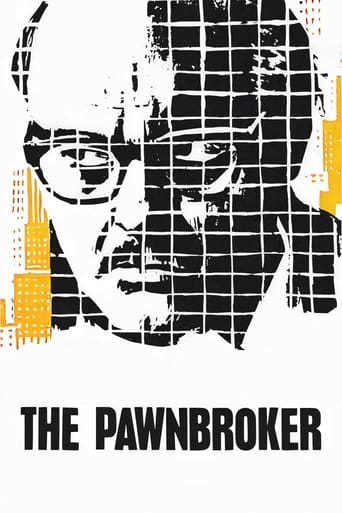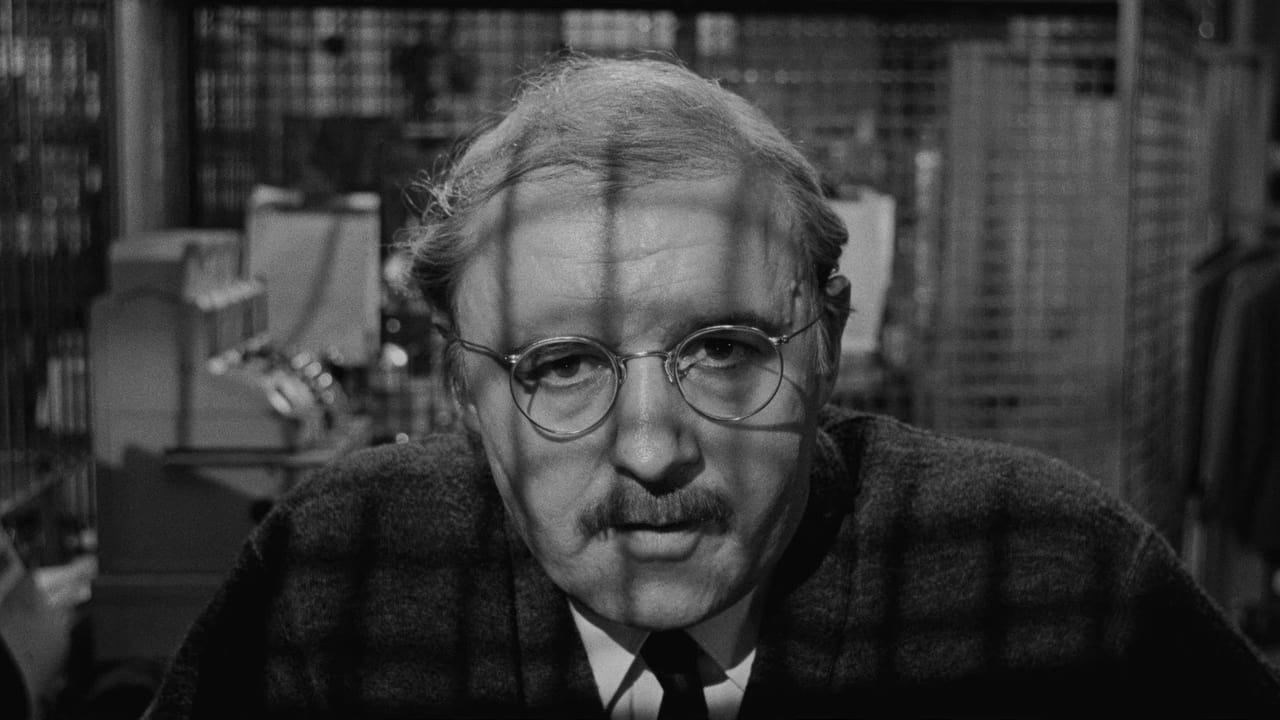sharky_55
The Pawnbroker deals not within the Holocaust but in its aftermath - such an event having an undeniable aftershock in the world's community. This type of treatment has a different power in 1964 than nowadays, where the Holocaust is a sacred and delicate topic reserved for but the most revered directors, demanding utmost solemnity. Compare this to Lumet's direction. See, for example, how the lively character of Jesus Ortiz is introduced to us. The setting is the dim, still pawn shop, and then Jesus bursts in from the side entrance like a sitcom character, blasts his trumpet a few times, and bumbles around without doing much work. The second person who breaches Sol's cage is a loud black woman, almost a walking stereotype, who reacts to his meagre offer for her ornate candlesticks with hysterical, over-the-top laughter, as if they were both in on a practical joke. Sol remains unmoved. Rod Steiger is a frigid and cold type. He shuffles silently around the interiors of his pawn shop, and Boris Kaufman captures his profile in a way so that it is always obscured and hidden behind layers of protection and distance, either physically in the shadows of bars over his face and the steel-mesh cage, or in his body language, in the way Steiger never holds a gaze while his customers unload the tales of their merchandise. They might as well be talking to a brick wall. Sol is unwavered by their nostalgia for these relics, and has a good reason for being unwilling to delve back into the past. His curt, clipped replies offer no weakness to probe or enter, and act as a foil to the emotional desperation of the customers who are often parting with treasured belongings because of dire financial need. In one particularly haunting sequence, a man walks hobbles in looking not for money but merely a face to talk to and an ear to listen, and Sol coldly turns him away. Lumet unveils the cracks slowly, as if wanting to avoid the branding of a Holocaust film immediately so that we are not so quick to cast our sympathies out. The direction doesn't force Sol's hand, but merely presents his circumstances in a way which reveals his past and how unforgettable the torment of the concentration camp must be. At first, subtly, he introduces characters which shake up the equilibrium of the lowly pawn shop. When black boys come in to pawn an expensive lawnmower, Sol directs a thinly veiled accusation at its origins, and we can feel the tension in the room. The object rocks his apparent cold impartiality, and through Steiger's eyes we witness him wresting between his disdain for the 'scum' and the silent front he has forged through years of suffering and mourning. Another is Marilyn Birchfield, the local social worker, who is so entirely honest and open-faced that we wonder how she has survived so long in Harlem. Because she presents herself as a figure of charity and future change, Sol rejects the very idea of her; such kindness and humility does not agree with his pessimistic worldview, forged from the horror of his experiences. When she tries to reach out (on the balcony of a sunny, skyscraper apartment, no less) he bitterly unleashes what he swore he would not release, and refuses her hand. The past is revealed in stuttered flashbacks, not as grand condemnations but as filtered and intensely personal memories which resurface despite Sol's insistence on pushing them down deeper. Lumet channels Alain Resnais, who in Night and Fog created a haunting juxtaposition of the past and present. While the camera hovers all around the city and slums, it picks up on indiscriminate events which are magnified through his vision; a man trying to escape from a gang of thugs reminds him of the barbed wire walls of the camp, and a pregnant girl pawning her ring forces his mind back to the image of Jewish wedding rings being picked off the conveyor line of the same fence. One sequence involving an prostitute's offer plays out like a tape rolling between two scenes over and over, as the site of bare breasts invokes an ugly memory of the rape of his wife. The unsettling effect is combined with overlapping sound tracks until the two scenes converge into one painful, singular moment for Sol. Sexual bliss has been long eradicated from his life - see how the edits flit from Jesus and his girlfriend in an animated tryst, and then to Sol and his partner, who treat sex like an oft-forgotten obligation, an act of silent passion.Steiger's greatest moment comes when he realises his complicity all these years with the local racketeer Rodriguez and his prostitution den, and his entire face scrunches up in agony because his distance has been all for nought. Quincy Jones' jazzed up, uninhibited score hurtles along with the camera through Harlem, and betrays Sol's old world sensibilities by being piped out from every murky street corner and store. There is excitement and energy leaking from the seams of the post-war society, one that he is quick to stamp out of his protégé. But in Jesus' death he finds new meaning and existence. The man who once felt the greatest pain of them all is allowed vulnerability once more, and perhaps a new start can finally begin.
spitfire2356
Rod Steiger is under the lens in this classic study of a man zombified by life events. Adjusting to losing family, country and way of life proves impossible even after 25 years. He grudgingly supports his brother's family to expiate the gnawing acid guilt of survival. The black and white stark cinematography, weather and drudgery of pawnbroking work combine to infuse a suffocating dead- end atmosphere. The bleak city neighborhood and down at luck faces of the crowded inhabitants are a continuation of the concentration camp. The walk- in wounded seeping into the shop with hard-life stories, are dealt summarily by the walking dead Scrooge shop-owner. Despite this they still try again - they have not been beaten by the system. Yet. We build up some hope that his over enthusiastic Latino assistant stands a chance of scratching the surface but we get suddenly disappointed when his modest dreams get cruelly rebuffed. A lonely woman reaches out but is repeatedly and very coldly spurned. His second wife suffers and hopes but is left clutching at empty air. The pimp (an excellent Brock Peters) reads him too well. He expertly carries on where the Nazi's left off. There is no let up for him. He is condemned to suffer all his life in a concentration camp. How much of it is self- imposed? He asks for a release in death, and even that is denied him. The death of his assistant takes time to jolt feelings of excruciating agony from him. He does open his mouth but no sounds come out. We are not sure what the emotion actually is however. The shocking realization that he had cruelly let down a person that had looked up to him - and that person has just given up his life for him. He suddenly and desperately wants to start feeling something, anything again. Even pain is better than nothingness. Another explanation is that he wants to kill himself, but only manages to hurt himself. It feels too little, too late. Open to interpretations like all the best endings. Definitely not a feel good film
kai ringler
Rod Steiger delivers the performance of a lifetime in this sad movie. the story is about a man who lives in New York runs a laundry mat,, and starts having flashbacks of the War when he was in the Concentration Camps. the story has some flashbacks, and they are very poignant. the old man takes on a younger partner in the Laundromat,, but later on Sol finds out that the money used to run the business also comes from a brothel.. there's not a lot of action in this,, but it doesn't need to have action,, this movie is based on pure raw emotion,, hatred, greed, and all of the things incorporated in a great drama. it's sad to see the detioration of Sol as the movie winds along. this is a very powerful and shocking movie, not to be watched by the lighthearted, i'm German so i will definitely watch this again.
Claudio Carvalho
In a poor neighborhood of New York, the bitter and lonely Jewish pawnbroker Sol Nazerman (Rod Steiger) is a survivor from Auschwitz that has no emotions or feelings. Sol lost his dearest family and friends in the war and the faith on God and the belief in mankind. Now he only cares for money and is haunted by daydreams, actually flashbacks from the period of the concentration camp. Sol's assistant is the ambitious Latin Jesus Ortiz (Jaime Sanchez), a former urchin that has regenerated and now wants to learn with Sol how to run a business of his own. When Sol realizes that the obscure laundry business he has with the powerful gangster Rodriguez (Brock Peters) comes also from brothels, Sol recalls the fate of his beloved wife in the concentration camp and has a nervous breakdown. His attitude leads Jesus Ortiz to a tragedy and Sol finds a way to cry. "The Pawnbroker" is a powerful and realistic story of bitterness, loneliness and disbelief in mankind of a man victim of the Holocaust. Rod Steiger has certainly the best performance of his career in the complex role of a skeptical and bitter Jewish. His assistant is an ambiguous character that contrasts with the pawnbroker with his optimistic and happy behavior. In the end, the pawnbroker feels the need to cry and impales his hand with a spike, also in a reference of Jesus Christ. My vote is eight. Title (Brazil): "O Homem do Prego" ("The Man of the Spike" – literally; however, it is a pun that also means "The Pawnbroker")


 AD
AD



